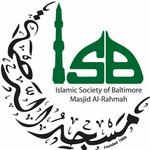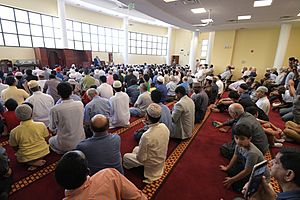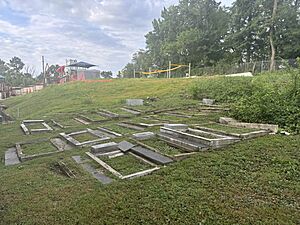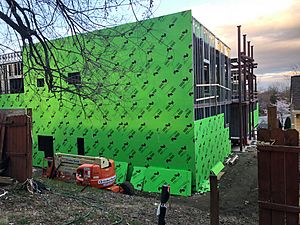Islamic Society of Baltimore facts for kids
 |
|

Larry Hogan speaking at ISB in 2018
|
|
| Abbreviation | ISB |
|---|---|
| Formation | September 2, 1969 |
| Founded at | Shaffer Hall, in the Homewood Campus of Johns Hopkins University |
| Legal status | Active |
| Purpose | Serves Muslims of the Baltimore area |
| Location |
|
| Services | Al-Rahmah School, Al-Rahmah Nursery, Al-Rahmah Quran Academy, Health Clinic |
|
President
|
Hasan Hammad |
Council Member(s):
|
|
The Islamic Society of Baltimore (ISB) is a special place for Muslims in Catonsville, Maryland. It's a community center with a mosque called Masjid Al-Rahmah, a school, and many other helpful services. Three Muslim doctors started ISB in 1969. It became well-known when President Barack Obama visited on February 3, 2016. As of 2019, ISB helps about 3,000 people.
Contents
History of the Islamic Society of Baltimore
The Islamic Society of Baltimore began in 1969. Three Muslim doctors started it. One of them was Mohamed Z. Awad, who was from Egypt. He helped create ISB because Muslims wanted to keep their religion strong. They also wanted to teach their children about their Islamic heritage.
Early members of ISB met every Sunday. They gathered at Shaffer Hall at Johns Hopkins University. There, they prayed, talked about religious texts, and studied Arabic. The group officially registered in Maryland on September 2, 1969.
Building a Mosque
In the 1970s, ISB started raising money to build a mosque. They held fundraising events called bazaars. These events took place at Johns Hopkins University. At first, most members were Muslims from other countries. They came from places like India, Pakistan, and the Middle East. By the end of the 1970s, ISB was helping about 100 families. These families came from many different backgrounds.
ISB bought land on Johnnycake Road in the late 1970s. Masjid Al-Rahmah, the mosque, was built there between 1982 and 1983. The mosque was designed for about 180 people. However, around 300 people would come for Friday prayers. By 1985, ISB had about 475 families as members.
In 1987, a gymnasium was added to the campus. The Al-Rahmah School also opened that year. It was a full-time school for students from kindergarten to 12th grade. It started with 27 students. The campus also has homes for people. The Al-Rahmah Quran Academy opened in 1999–2000. It began with just one student.
Community Support After 9/11
After the September 11 attacks in 2001, leaders from nine Baltimore mosques met at ISB. They talked about how to help victims. Police officers were stationed at the mosque to keep watch. On September 23, ISB held an open house for everyone. Martin O'Malley, who was then the mayor of Baltimore, attended. In the weeks after the attacks, ISB did not report any major problems.
Security Measures
In April and May 2015, ISB received two phone threats. The first call was to the school. The caller asked about school closing times and then mentioned bombing a bus. The second call threatened to "spill Muslim blood." The Baltimore County Police Department did not think the threats were real. However, they increased security on the ISB campus to keep everyone safe.
Barack Obama's Visit
On December 14, 2015, the White House met with Muslim leaders. They discussed concerns about growing unkindness toward religious groups. These leaders asked President Barack Obama to visit a mosque. They had been asking for this for years.
On January 28, 2016, ISB officials learned that President Obama might visit. The White House officially announced the visit on January 30. A White House official said the visit was to celebrate how Muslim Americans help the country. It also showed how important religious freedom is in the United States.
President Barack Obama visited ISB on February 3, 2016. This was his first time visiting a mosque in the United States as president. He talked with Muslim community leaders. He also gave a speech. In his speech, he spoke against harsh words and violence aimed at Muslims. He also talked about Islam's role in American history.
Campus Expansion (2018–2020)
County officials asked ISB to remove temporary classroom trailers. There were too many on the campus. About ten Al-Rahmah School classes were held in these trailers because the main building was too small. ISB made plans to expand its campus. They got permission from the county. A special ceremony to start construction happened in October 2018.
The expansion plans included adding a library and more classrooms. They also planned larger prayer areas for big events. The Al-Rahmah Quran Academy would move closer to the main building. This project was expected to cost about $2 million. It was planned to finish by August 2019. This timing was special because it was ISB's 50th anniversary. The "50 Strong" campaign celebrated both the anniversary and the expansion. ISB collected old photos and documents. These were shown in a special project for the anniversary.
Responding to the COVID-19 Pandemic
When the COVID-19 pandemic started, ISB took action. They canceled all prayers and events. Instead, they broadcast programs and religious activities on their YouTube channel. This way, people could still participate from home. Mosque leaders formed a team of doctors. This team gave advice on safety rules.
During Ramadan, ISB gave out "Blessing Boxes." These boxes had flour, oil, rice, and other food items. They helped Muslim families affected by COVID-19 break their fast. ISB also set up a drive-through for families to get meals safely. ISB received a grant of at least $3,000 from the Baltimore County COVID-19 Emergency Response Fund. This money helped them promote public health.
See also
- Islam in Maryland
- List of mosques in the United States
 | Frances Mary Albrier |
 | Whitney Young |
 | Muhammad Ali |



